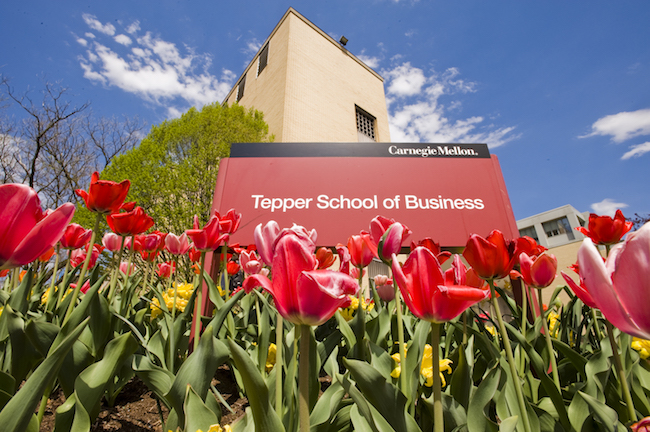At Carnegie Mellon University, the business and economics departments have a rare relationship. Both majors fall under the Tepper School of Business umbrella, and economics majors have access to B-school classes, clubs, and recruiting.
At CMU, business majors must apply very early on for the four-year program. So for those who start out undeclared, or who don’t develop an interest in business until later on, economics is another way in. Now that department is making an effort to help econ students show off to future recruiters.
This year, the Tepper economics major will have brand-new concentrations in areas like Market Design, Global Markets and Finance, and Economics and Public Policy. The idea, says Chris Sleet, head of the Economics Department at CMU, came from within the department, and it was met with enthusiasm.
“There were different motivations,” Sleet says. “We wanted to communicate clearly to students how the courses interconnect. And we wanted it to be easier for students to convey to potential employers what they’re experts in.”
THE NEW CONCENTRATIONS
There will be six new concentrations, Sleet says. He is especially excited about Market Design. “It’s an emerging area of economics which studies why some markets succeed and why others fail, and how you can design a new market,” he says. “So it looks into the strategic interactions of the different market participants, and based on that, how we should design a market to meet certain goals.”
Another new concentration is Economics of Public Policy, which will investigate the role of economics in areas like health, taxes, law, and education. “For example, various cities have school districts that assign certain students to schools,” Sleet says. “So how should we assign students to schools based on their preferences and those of the schools districts?”
The other concentrations are also geared toward students hoping for careers in certain aspects of business or economics. Advanced Quantitative Economics Methods is meant for students considering a graduate degree in economics. Strategy and Markets is meant for students considering careers in consulting. Global Markets and Finance will explore the sources of financial crisis and the role of the Federal Reserve in the economy. And the Economics of Global Change and Disruption will focus on key trends that are reshaping the world economy.
DRAWING RECRUITERS IN
Sleet says he hopes the concentrations will help specify students’ interests for recruiters. “We want them to see ‘This student is a CMU Tepper economics major,’ and underneath that, a second headline reading ‘with a concentration in market design,’” Sleet says.
Recently, both economics and business majors have been gaining popularity. Burton Hollifield, head of undergraduate business, says around 85-90 students graduated with a business degree last spring. In four years, he expects to graduate a class of 150. Similarly, the economics department, which graduates about 50 students per year, has seen a steady increase.
The Tepper School is getting a new, modern building in a couple years, and Hollifield thinks the promise of the new facility may be driving more people to the two majors. And he added that bigger programs may have an effect on recruitment in the future. “Since we’ll have a bigger scale, maybe more recruiters will be interested in coming here,” he says. “So the opportunity for these students is very strong.”













Questions about this article? Email us or leave a comment below.